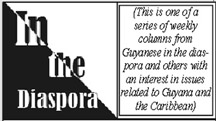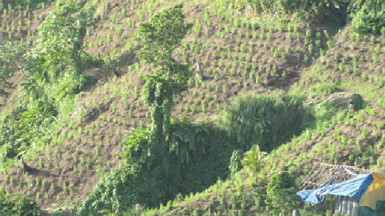By Kevin Edmonds
Kevin Edmonds is a PhD student, at the University of Toronto and is affiliated with the Center for Critical Development Studies and the Caribbean Studies Program. His research is focused on the Caribbean, examining the connections between neoliberalism, drug cultivation and the potential for alternative development strategies in the region.
January 2015 will mark the 20th anniversary of the creation of the World Trade Organization (WTO) and its one size fits all prescription for global trade. Despite its steadfast refusal to do otherwise, dominant economic theory must take into account the diverse realities of the countries which make up the global community. Due to matters of geography and history, no two countries are alike – and any effort to universalize a set of best economic practices is fundamentally and dangerously incorrect.

The statistics of economic growth reveal that contrary to the assumptions made by proponents of free trade, trade liberalization has not increased economic growth in St. Lucia and St. Vincent. Indeed in recent years one can see a trend of stagnation – if not outright decline. As Vincentian farmer Ras Jacob laments, “the IMF/WTO put them in poverty, they mash down all the EC [Eastern Caribbean] livelihood”.
At the behest of the WTO and spearheaded by the banana multinational corporations (with no less than former US President Bill Clinton as their dedicated advocate), a gradual elimination of the protected banana trade with the United Kingdom began, as it contradicted the assumptions of neoliberal economic theory. These reforms would lead to numerous negative and widespread impacts on rural communities – such as an increase in unemployment, poverty, crime and a dramatic cutback in government programs and services. Given that there were no readily apparent jobs to replace those lost in the banana industry, a great deal of the farmers took their skills, knowledge and cutlasses into the hills.
Twenty years after this economic shock, based on its size, St. Vincent and the Grenadines is one of the largest, if not the largest per capita cultivator and exporter of ganja in the world. During my research on the island studying the ganja trade, I have been fortunate enough to have learned from farmers, activists, smugglers and dealers – providing incredible insight into St. Vincent’s real, albeit illicit economic engine.
Presently in the Caribbean, marijuana is not legally recognized for its medicinal purposes. In March 2014, the Heads of Government of the Caribbean Community (CARICOM) established a regional commission concerning marijuana use, with the Prime Minister of St. Vincent and the Grenadines, Ralph Gonsalves, acting as the Chair. The two primary focuses of the regional commission are concerned with the medical use of marijuana and the decriminalization of small quantities involved in recreational use.
A July 2014 communiqué from the CARICOM conference in Antigua put forward that the “Heads of Government agreed to establish a Regional Commission on Marijuana to conduct a rigorous enquiry into the social, economic, health and legal issues surrounding marijuana use in the Region and to advise whether there should be a change in the current drug classification of marijuana, thereby making the drug more accessible for a range of users.” Since then, not much else has been released to the public, as a search of CARICOM internet archives and requests for updated information have not produced any new information on the progress of the initiative.

Despite this, Prime Minster Gonsalves has tried to deflect criticism that the Commission would be an asset to his election drive, stating that regardless of the politicization of the situation, “I am hoping that we take more than baby steps in addressing the issues”
Seeking to avoid the politicization of the issue, Conley “Chivango” Rose, the Coordinator of The National Marijuana Industry Association (NMIA) of St. Vincent and the Grenadines is working to get a medical marijuana institute built in St. Vincent, due to its position as the leading cultivator in the Eastern Caribbean. Rose told me that roughly “40 percent of the population are connected to the industry either directly or by accommodating it” and that an estimate that ganja contributes 30 percent to the GDP is quite conservative. Rose argues that the Caribbean must abandon current laws which are based on inherited colonial legislation, and calls for a major reform of the region’s ganja laws, arguing that they be based on “science, compassion and reason”.
The National Marijuana Industry Association (NMIA) of St. Vincent and the Grenadines states in its charter that “Medicinal and Recreational Marijuana Sales in St. Vincent and the Grenadines could generate extra revenues and taxes for the government in licenses, fees, sales taxes, VAT, excise taxes and so on, government and the people would benefit tremendously from this lucrative industry… According to Vincentian economists, financial analysts, tax collectors, bankers and professional accountants, marijuana, if regulated and taxed in the same fashion as alcohol, can bring in over $500 million dollars for the St. Vincent and the Grenadines economy between 2014-2016 ! Much needed revenue to assist in stimulating growth, creating wealth and helping to transform the economic landscape of the island”.
While the legalization of ganja would bring immediate economic benefits, it would also have widespread social consequences. Ras Andre believes that the legalization of ganja will lead to a greater transformation in the class structure of St. Vincent and the wider Caribbean, stating that “It will be a class change, you have poor citizens getting into a multi-billion industry, who is poor is now becoming rich, while people which have become comfortable in their wealthy lifestyles will get shifted… This is important for people like Rasta, who are marginalized – but with this change they will be able to handle their affairs, to many it is frightening”.
In addition to the legalization of ganja changing the island’s entrenched class structure, it would also free up a huge sector of economic activity from the criminal element.
One farmer, “Power”, highlighted that it is the criminalized status and classification of ganja as a dangerous drug which leads to crime, arguing that “In the heights we always exposed to the thief man, our investment is at risk. Very often there are rip-offs where people saying the crop bust when they made a shot [got intercepted by the police during smuggling abroad], when they really keeping it themselves. This is what gets people killed. If it was legal we could have real sales and not have to worry and hide”. Additionally, he argues that it is the hustle and profit of ganja which has led to the “baldheads going up in the hills, brining guns, cocaine, crime and robbery”.
As another planter, and a very skilled, self-taught horticulturalist, “Bongo” stated, “We need to separate ganja from the drug trade… It is unfairly attacked because of what has been colonial and cultured in the mind. Ganja has helped so many people, sent thousands of children to school and bought plane tickets for being to go foreign and better themselves. We are losing a golden opportunity, if we don’t move on this we won’t have anything. It will be turmoil”.
To Empress Modupe Olufenmi Jacob, it must also involve the “creation of provisions to compensate those who have been charged and jailed before it was legal” and “ensure that the farmers who have sacrificed for so long are the immediate beneficiaries of a regulated system to plant legal ganja”.
Indeed there was also a sharp criticism of the political leadership, with many arguing that independent governments and the CARICOM Commission were moving far too slow. While the legalization of ganja is often portrayed or presented as a panacea for much of the region’s economic woes, it would certainly go a long way in increasing respective governmental revenues, providing legal employment and sparing vast numbers of people from the prison system. For these reasons alone the individual and regional leadership must push forward with their efforts to at the very least, decriminalize marijuana and allow medicinal marijuana for compassionate and research purposes. If they continue to take a “wait and see” attitude on this issue, they will indeed see that regional competitors will have taken the lead, scrambling to justify their position to a population in a society which has no real opposition to ganja. As Conley Rose said, “Ganja is not a fad, it done been here for a long time”.
